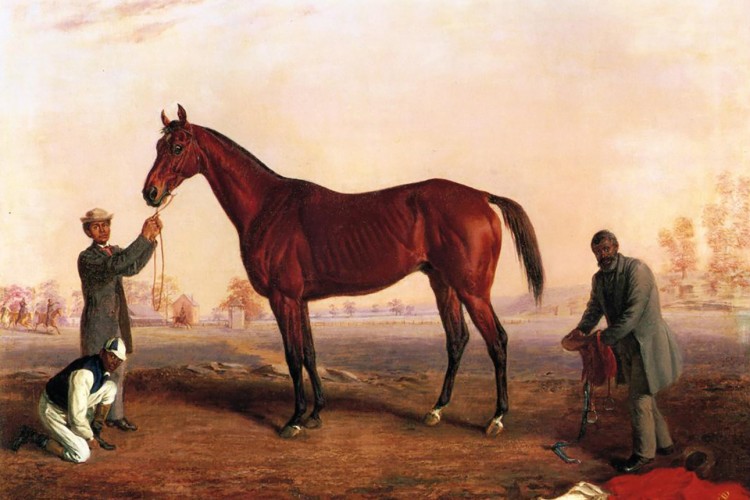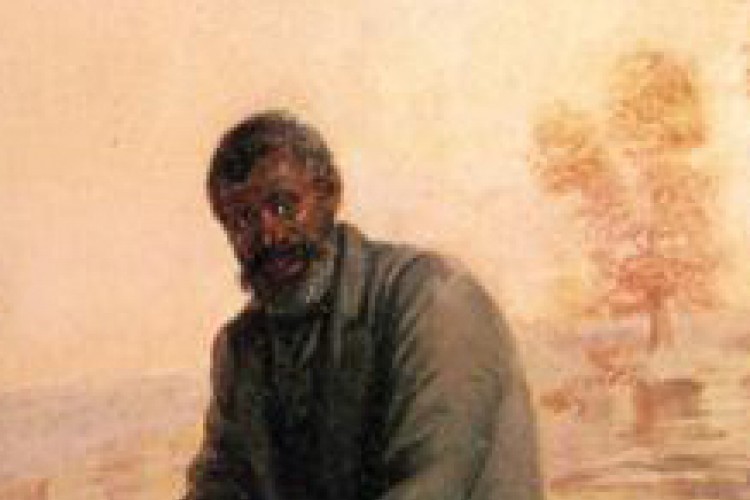Isaac Burns Murphy
Childhood and Apprenticeship
Isaac Burns Murphy was born to Jerry Burns and America Murphy in Bourbon County, Kentucky. His father joined the United States Colored Troops and died of camp fever shortly after his enlistment in the Army. Murphy was only three years old.1 When he was ten years old, his mother also fell sick. She asked family friends, Eli Jordan and his wife to take in Murphy so that he may learn a profession.
Jordan was a horse trainer at the stables of James T. Williams. Murphy began working there too as an exercise rider. He was thrown off his first ride and it took some “vigorous instruction” to get him back in the saddle.2
Record-Setting Jockey
In his day, Murphy stood “at the head of all American jockeys, and whose services as a rider are in constant demand at race meetings.”3
During his career, he won many notable races. He won several of them multiple times:
- American Derby (1884, 1885, 1886, 1888)
- Kentucky Derby (1884, 1890, 1891)
- Latonia Derby (1883, 1885, 1886, 1887)
- Suburban Stakes (1890)
With these and other triumphs, Murphy won 44% of his races, a record that remains unbroken. The Louisville Courier-Journal reported on his accomplishments, claiming that “[f]or several years, his annual earnings were four or five times those of a United States Senator, and he was better known than most statesmen.”4
Mourned by Many
The extreme measures that Murphy endured to maintain a low weight were detrimental to his health. He died of heart failure at the age of thirty-five. With his passing, the extent of his community involvement, his stature within the horse industry, and his sheer wealth were all evident.
The Masonic Lodge and his brethren of the Lincoln and Sardis Lodges buried Murphy. He had served as Senior Warden, second in command to the Master of the Lodge.5 The funeral chorus was conducted by the Lexington Choral Club.
His pallbearers consisted of well-known African American horsemen:
- John T. Clay
- Henry Mack
- Lee Christy
- Howard Williams
- Edward Dudley Brown
- William Walker
- H. S. Williams
As a final ode to both his status and wealth, Murphy was laid to rest in a special casket, “which is one of the finest ever seen in Lexington… trimmed in royal purple, and is a duplicate of the one in which General Grant was buried.”6
Enduring Legacy
Murphy was not only an extraordinary horseman but “known by all [as] an honest man”, “a sterling character”, and “absolutely incorruptible”.7 In celebration of his stellar career, the National Racing Hall of Fame inducted Murphy as the first jockey at its creation in 1955.8
While no jockey has ever matched him, the National Turf Writers Association presents the Isaac Murphy Award to the North American jockey with the highest win percentage each racing season. In 2014, the Isaac Murphy Memorial Art Garden was built in Lexington, Kentucky at the site where his home originally stood. The location is across from the original grounds of the Kentucky Association racetrack, where Murphy had impressed crowds with his craft.
Sources
Ballard, Sr., Dr. W.H. 1950. History of Prince Hall Freemasonry in Kentucky. Lexington, KY: Prince Hall Free and Accepted Masons.
Berri, David. n.d. “The Disappearance Of The African-American Jockey.” Forbes. Accessed January 5, 2020. https://www.forbes.com/sites/davidberri/2018/06/11/the-disappearance-of-the-african-american-jockey/.
Chicago Daily Tribune. 1885. “A Jockey’s Life; Isaac Murphy Tells How the Riders of Thoroughbreds Train Themselves,” July 10, 1885.
International Museum of the Horse. 2018. Black Horsemen of the Kentucky Turf: Companion Book to the Exhibit at the International Museum of the Horse. First. Kentucky Horse Park.
Kentucky Live Stock Record. 1891. “Winning Jockeys in 1890,” March 28, 1891, Vol 33, #13 edition.
Lexington Transcript. 1891. “Grand Reception Given by Isaac Murphy and Wife, to Anthony Hamilton and Bride,” January 25, 1891.
McDaniels, Pellom. 2013. The Prince of Jockeys: The Life of Isaac Burns Murphy. Lexington, Kentucky: University Press of Kentucky.
McKenzie, Sheena. 2013. “The Forgotten Godfathers of Black American Sport.” CNN. February 22, 2013. https://www.cnn.com/2013/02/22/sport/black-jockeys-horse-racing-sports-stars/index.html.
New York Times. 1885. “Freeland’s Famous Jockey. Joe Cotton’s Owner Tells How He First Taught The Boy To Ride.,” August 20, 1885.
The Courier-Journal. 1896. “Isaac Murphy,” February 15, 1896.
The Leader. 1896a. “Noted Jockeys To Act As Pall Bearers At Isaac Murphy’s Funeral,” February 14, 1896.
———. 1896b. “Last Rites, The Funeral of Isaac Murphy This Afternoon,” February 16, 1896.
“Widow’s Application for Military Pension Certificate # 137891.” 1869. Box #33227. National Archives, Washington, D.C.
Winchester Sun. n.d. “Black History: Legendary Jockey May Have Been Clark Native.” Accessed February 29, 2020. https://www.winchestersun.com/tag/isaac-murphy/.
Citation
When citing this article as a source in Chicago Manual of Style use this format: Last name, first name of Author. Chronicle of African Americans in the Horse Industry. n.d. “Title of Profile or Story.” International Museum of the Horse. Accessed date. URL of page cited.
- 1“Widow’s Application for Military Pension Certificate # 137891.”
- 2“Freeland’s Famous Jockey. Joe Cotton’s Owner Tells How He First Taught The Boy To Ride.”
- 3“A Jockey’s Life; Isaac Murphy Tells How the Riders of Thoroughbreds Train Themselves.”
- 4“Isaac Murphy.”
- 5“Last Rites, The Funeral of Isaac Murphy This Afternoon.”; Ballard, Sr., History of Prince Hall Freemasonry in Kentucky.
- 6“Noted Jockeys To Act As Pall Bearers At Isaac Murphy’s Funeral.”
- 7“Last Rites, The Funeral of Isaac Murphy This Afternoon.”; “Freeland’s Famous Jockey. Joe Cotton’s Owner Tells How He First Taught The Boy To Ride.”
- 8McKenzie, “The Forgotten Godfathers of Black American Sport.”






